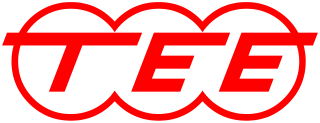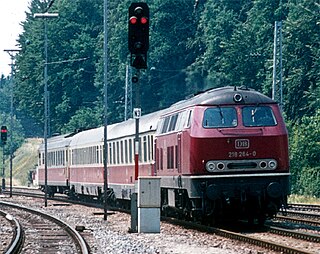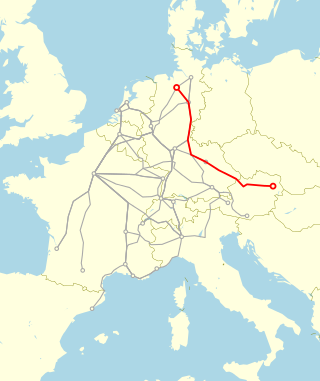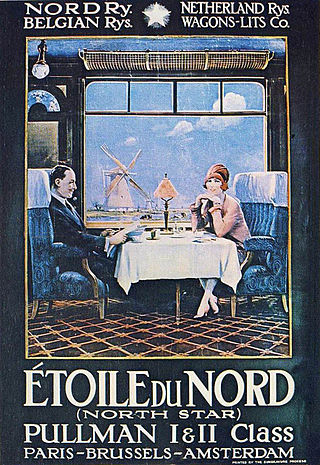See also
- Trans-Euro Express, a stageplay by Gary Duggan
- Transeuropa (disambiguation)
Trans Europ Express is a former international train network in Europe.
It may also refer to:
Europa may refer to:

The Rheingold ('Rhinegold') was a named train that operated between Hook of Holland, near Rotterdam, and Geneva, Switzerland, a distance of 1,067 kilometres (663 mi), until 1987. Another section of the train started in Amsterdam and was coupled to the Hoek cars in Utrecht. The Rheingold ran along the Rhine River via Arnhem, Netherlands, and Cologne, Germany, using special luxury coaches. It was named after Richard Wagner's Das Rheingold opera, which romanticized the Rhine. From 1965 until the train's discontinuation in 1987, the Rheingold was a first-class-only Trans Europ Express (TEE) train.

Trans-Europe Express is the sixth studio album by German band Kraftwerk. Recorded in 1976 in Düsseldorf, Germany, the album was released in March 1977 on Kling Klang Records. It saw the group refine their melodic electronic style, with a focus on sequenced rhythms, minimalism, and occasionally manipulated vocals. The themes include celebrations of the titular European railway service and Europe as a whole, and meditations on the disparities between reality and appearance.
DB 601 may refer to:

The Trans Europ Express, or Trans-Europe Express (TEE), was an international first-class railway service in western and central Europe that was founded in 1957 and ceased in 1995. At the height of its operations, in 1974, the TEE network comprised 45 trains, connecting 130 different cities, from Spain in the west to Austria in the east, and from Denmark to Southern Italy.
Transeuropa or TransEuropa or Trans-Europa or variation, may refer to:
A tee is an item of sports equipment, used a.o. in golf.

"Trans-Europe Express" is a song by German electronic music band Kraftwerk. It was released as the lead single from their studio album of the same name in 1977. The long version of the song was on the original released album, is 13:44 long, and split into two or three parts. The music was written by Ralf Hütter and the lyrics by Hütter and Emil Schult. The track is ostensibly about the Trans Europ Express rail system, with technology and transport both being common themes in Kraftwerk's oeuvre.

The Bavaria was an express train that linked München Hbf in Munich, Germany, with Zürich HB in Zurich, Switzerland. Introduced in the 1950s, it ran through to Geneva until 1969, when it was cut back to Zurich. The train was named on the basis that Bavaria is the Latin equivalent to the German word Bayern, the official name of the federal state of Bavaria, of which Munich is the capital. It was operated by the Deutsche Bundesbahn / Deutsche Bahn (DB) and the Swiss Federal Railways (SBB-CFF-FFS). The route also included a single stop in Austria, at Bregenz. The 24 km (15 mi) section between Lindau, Germany, and St. Margrethen, Switzerland, is located mostly in Austria, but Swiss locomotives hauled the train over this section, most of which is part of the Vorarlberg line of Austrian Federal Railways.

The Arbalète was an express train that linked Paris-Est in Paris, France, with Zürich HB in Zurich, Switzerland. Introduced in 1957, it was operated by the SNCF and the Swiss Federal Railways (SBB-CFF-FFS).

The Helvetia was an express train that, for most of its existence, linked Hamburg-Altona station in Hamburg, Germany, with Zürich HB in Zurich, Switzerland. Introduced in 1952, it was operated by the Deutsche Bundesbahn / Deutsche Bahn (DB) and the Swiss Federal Railways (SBB-CFF-FFS). The train's name, Helvetia, is the Latin word for "Switzerland".

The Goethe was an express train that, for most of its existence, linked Paris-Est in Paris, France, with Frankfurt Hbf in Frankfurt, Germany. Introduced in 1970, it was operated by the SNCF and the Deutsche Bundesbahn / Deutsche Bahn (DB).

The Edelweiss was an international express train. For most of its existence, it linked the Netherlands with Switzerland, via Belgium, Luxembourg and France. Introduced in 1928, it was named after a mountain flower, the Edelweiss, which is associated with alpinism and the Alps, and regarded as a symbol of Switzerland.

The word Rheinpfeil was used to name a number of express trains that ran in Germany between the 1950s and 1991. For much of that period, a train carrying the name Rheinpfeil also linked Germany with at least one neighbouring country.

The Albert Schweitzer was a short-lived express train that linked Dortmund Hbf in Dortmund, Germany, with Strasbourg-Ville in Strasbourg, France. Introduced in 1980, it was operated by the Deutsche Bundesbahn (DB) and the SNCF.

The Prinz Eugen was an express train that linked northern Germany with Wien Westbf in Vienna, Austria. Introduced in 1971, it was operated by the Deutsche Bundesbahn / Deutsche Bahn (DB) and the Austrian Federal Railways (ÖBB).

The Étoile du Nord was an international express train. It linked Paris Nord in Paris, France, with Brussels, Belgium, and, for most of its existence, also with Amsterdam CS in Amsterdam, the Netherlands. Its name meant literally "Star of the North", and alluded not only to its route heading north from Paris, but also to one of its original operators, the Chemin de Fer du Nord.

The word Mediolanum has been used to name three distinct international express trains that have run to and from Milano Centrale in Milan, Italy since 1957. The focus of these trains on the city now known as Milan reflects the fact that Mediolanum is the Latin word for ancient Milan.

The Ticino was an express train that linked Milan in Italy, with Zürich, Switzerland and for some years even to Munich, Germany. The train was named after the Canton of Ticino in the south of Switzerland. Introduced in 1961, it was a first-class-only Trans Europ Express (TEE) service until 1974. Later, it was a EuroCity service.
Transeuropean or Trans-European or variant, may refer to: